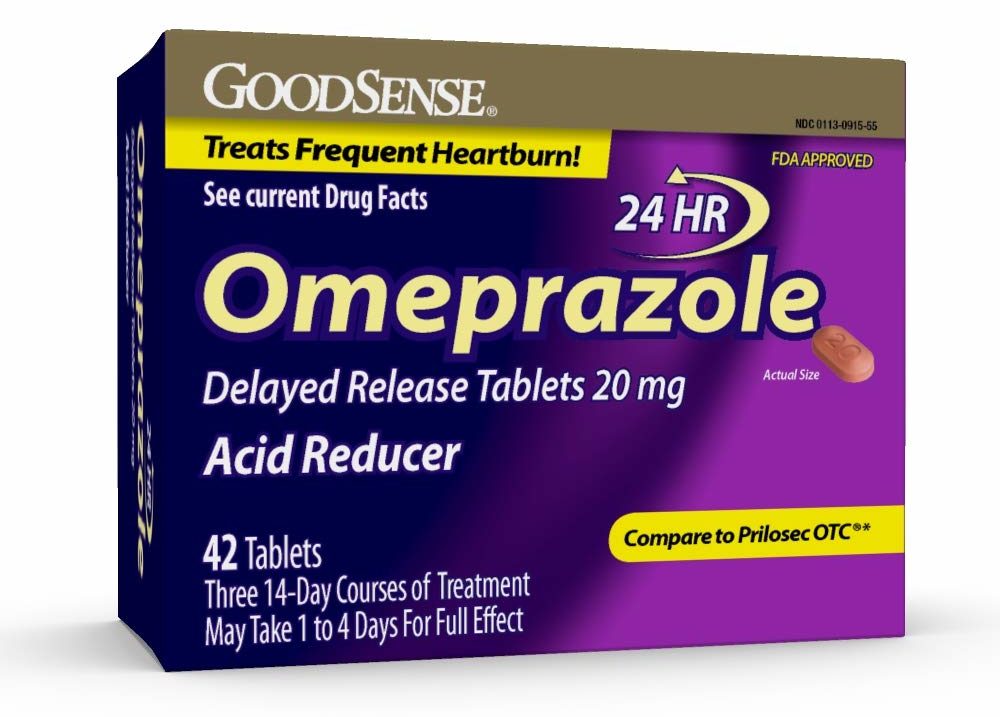Omeprazole Uses: Omeprazole medication reduces the stomach acid in order to treat acid reflux, acid indigestion, stomach ulcers and to relieve from heartburn. Omeprazole medication is also used to treat conditions such as gastroesophageal reflux disease (GERD), and Zollinger-Ellison syndrome.
Omeprazole is also used for prevention of stress-related mucosal damage in patients taking NSAIDs after surgery.
Omeprazole Pronounce
The Omeprazole medication name is pronounced as follows: ow·meh·pruh·zowl.
Omeprazole Brand Name
Omeprazole is sold under the brand names Losec, Prilosec, and Zegerid. It is also available in generic form.

How to Take Omeprazole?
Omeprazole is taken by mouth. The Omeprazole medication belongs to a group of drugs called proton pump inhibitors (PPIs). The benefits of taking Omeprazole include relief from heartburn, acid indigestion, and stomach ulcers.
Omeprazole should be taken as prescribed by your doctor. It may take up to four weeks for the side effects to subside after stopping the medication.
Omeprazole Dosage
Omeprazole Prescription Strength
Omeprazole medication is taken at the same time each day. The usual dose of Omeprazole is 10 mg once daily for adults. The dose may be increased to 20 mg once daily for those who do not adequately respond to the standard dose of 10 mg once daily, with no more than 40 mg in a single day.
The Omeprazole medication may also be taken before eating to prevent symptoms of acid reflux (such as heartburn). It is usually given in the morning, with or without food.
How much Omeprazole can I take in a day?
Your doctor should decide on how much Omeprazole can you take a day, however, most patients takes between 10-20 mg of Omeprazole, per day.
In patients with severe hepatic impairment, a reduced dose of 5–10 mg once daily is recommended since the half-life of Omeprazole medication in this group is prolonged and concentrations may be higher than in patients with normal hepatic function.
Omeprazole how fast does it work?
Omeprazole starts to work within around 1 hour of taking the medication and its duration is up to 4 hours.
Omeprazole Side Effects
Omeprazole medication has been known to cause low potassium levels, which can be treated with supplements. The FDA has issued a warning about the side effects of Omeprazole. The warning recommends that patients should avoid the use of Omeprazole for more than 14 days without a doctor’s approval.
The most common Omeprazole Medication (40/20/10 mg) side effects are:
- Hadache
- Diarrhoea
- Heartburn
- Nausea
- Vomiting
- Abdominal pain
- Interactions with some other medications and supplements
There are few other side effects of Omeprazole medication, if you take it then you should visit your doctor periodically for blood work to make sure your are not developing other problems.

Can Omeprazole Cause Constipation?
Yes. Omeprazole has been reported to cause constipation. This can be reduced by increasing the amount of liquid you drink. For patients who complain of constipation, doctors usually do not prescribe the proton pump inhibitor Omeprazole medication, but rather a drug that lowers the amount of stomach acid.
Can Omeprazole Cause Diarrhea?
Yes. Omeprazole medication can cause diarrhea. It is also possible that the drug might cause certain side effects, and it is important to discuss this with your doctor. Some of these side effects include stomach cramps and changes in bowel habits. Diarrhea and vomiting are also some of the most common side effects caused by Omeprazole.
Omeprazole Warnings
Omeprazole may cause a loss of body water (dehydration), especially if you are not getting enough fluids normally. Dehydration may cause seizures, confusion, muscle weakness, and fainting.
Some people using drugs like Omeprazole for a long time may have low levels of magnesium in their blood. This can lead to a type of severe reaction called hypomagnesemia which can be life-threatening.
Seek medical attention right away if you develop any of these symptoms: Severe nausea including vomiting; Severe stomach pain; Trouble breathing; Sudden changes in vision including blurred vision, double vision or seeing halos around lights; Muscle weakness or contractions that do not stop!
Omeprazole Long Term Use
Omeprazole long term use can result in decreased production of gastric acid which may affect your ability to fight infections. Also the long term use of Omeprazole medication may lead to vitamin B12 deficiency, folate deficiency, anemia and osteoporosis.
Can Omeprazole Cause Cancer?
Yes. It’s true that studies have shown a small association between long-term use of Omeprazole and certain types of cancer, including esophageal and stomach cancer. But it’s important to realize that the risks are very rare, and the benefits of Omeprazole likely outweigh these risks.
Can Omeprazole Cause Weight Gain?
Yes. In a recent study, it was found that people who had been taking Omeprazole for at least a year gained an average of 5 pounds. Although percentage wise this is only about 1% of their body weight, this is still a notable side effect. It has also been shown in some studies to cause sodium retention and water retention which in turn may cause weight gain.
Omeprazole Over the Counter
Over the counter medications, such as Omeprazole, that are used for treating heartburn (acid reflux), ulcers, and gastroesophageal reflux disease GERD can be bought at your local pharmacy or ordered online.
However, you should always see a doctor who will prescribe the right medication for you.
Omeprazole is usually available at major retail stores such as Walmart or online stores such as Walgreens.

Omeprazole Medication Interactions
Omeprazole and other acid reducers can interact with a number of medications, decreasing their effects. For example, Omeprazole can reduce the effectiveness of iron supplements, at least in restoring iron stores, but not necessarily red blood cell production.
One problem is that the acids produced when you take an acid reducer medication may leach minerals such as Calcium from your bones (increasing your risk for osteoporosis). Therefore, you should discuss this with your doctor to find out which medications you should avoid taking with Omeprazole and why.
Your doctor may be able to prescribe other medications or a different brand of PPIs which will not produce these side effects and which supplements you should taking along with Omeprazole, such as Vitamin D and Calcium supplements.
Is Omeprazole Safe?
Yes. Omeprazole medication is considered a very safe, while there have been some rare cases of severe adverse effects associated with the use of Omeprazole, it is generally considered to be safe.
Is Omeprazole an Antacid?
No. Omeprazole medication is not an antacid but it does belong to the same class of proton pump inhibitors drugs that includes Nexium, Prevacid and Prilosec which counteracts the production of stomach acid.
Omeprazole in Pregnancy
Omeprazole medication is not recommended for use in pregnant women with gastroesophageal reflux disease. The risk of malformations in babies born to mothers taking Omeprazole has been reported as high as 1%. Omeprazole in pregnancy should be avoided if possible as it will cross the placenta and may result in harm to a developing fetus.
Omeprazole vs Pantoprazole
The major difference between Omeprazole and Pantoprazole is that the latter, due to its higher oral bioavailability, has a significantly quicker onset of action.
Pantoprazole is actually the newer and better drug, which was approved in 1999. Omeprazole was actually discovered first, but pantoprazole answered some questions that were raised by the Food and Drug Administration (FDA).
Pomeprazole and Pantoprazole medications serves the same purpose, however, Pantoprazole has a longer half-life than Omeprazole (the amount of time it stays in your body before being metabolized), so you take it less often. It also has a better side effect profile than Omeprazole.
Pantoprazole medication is absorbed by the active transport system while Omeprazole is not. Pantoprazole reaches higher concentration in the body than Omeprazole. Theoretically, pantoprazole has better bioavailability and thus it can be given at lower dosage. So if a patient needs a high dose of proton pump inhibitor then pantoprazole may be preferred to Omeprazole.
Finally, Omeprazole is more expensive than Pantoprazole.
Omeprazole vs Famotidine
Omeprazole and Famotidine are almost identical. In fact, the only real difference is that they are chemically different, and cannot be taken at the same time. Omeprazole turns into an acid after absorption in your body, which decreases the amount of acid your stomach makes when it tries to digest food. Famotidine does not turn into an acid after absorption in your body.
Both Omeprazole and Famotidine work very well for reflux disease, both come with a risk of side effects. Omeprazole is more expensive than Famotidine.
Omeprazole vs Esomeprazole
The only difference between Omeprazole and Esomeprazole is that esomeprazole is an S-isomer of Omeprazole, which means you have a mirror image. Both have the same efficacy, safety and side effects. So, it’s just a matter of personal preference. Omeprazole is also more expensive than Esomeprazole.
Omeprazole vs Pepcid
Omeprazole and Pepcid are two of the most common treatments for GERD, or gastroesophageal reflux disease. Both medications are available in pill form, but Omeprazole is also available in liquid form. While both drugs belong to the same class of medications, they do work differently and have slightly different side effects. This is why some physicians recommend one over the other depending on a patient’s specific situation. When it comes to the price, Omeprazole costs more than Pepcid.
Omeprazole for Dogs
Dogs or cats with symptoms of GERD (gastroesophageal reflux disease) including vomiting, heartburn, regurgitation, poor appetite, weight loss, and lethargy may be prescribed Omeprazole. It is also used to help prevent damage that the stomach’s contents may cause on the esophagus. Speak to your veterinarian about giving your pet this drug.
Conclusion
Omeprazole how does it work?
Omeprazole belongs to a class of medications known as proton pump inhibitors (PPIs). Omeprazole blocks the production of stomach acid which prevents ulcers. It is also used to treat gastroesophageal reflux disease, or GERD.
Omeprazole medication may also be used in combination with antibiotics to treat H. pylori, a type of bacteria that causes ulcers and gastritis.
Omeprazole side effects may cause headache, diarrhea, and dizziness. Although Omeprazole is generally safe to use in most cases, it’s not suitable for everyone. Despite that Omeprazole is an over the counter medication, it should be taken based on a doctor’s prescription.
If you enjoyed reading this article about Omeprazole, you may want to checkout Apple Juice Benefits for Relieving the Symptoms of Acid Reflux and Gastroesophageal Reflux Disorder (GERD) Signs.
References about Omeprazole medication: